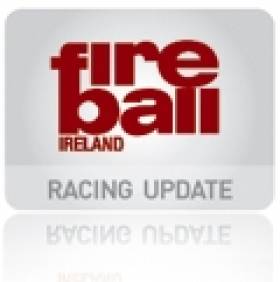Displaying items by tag: Fireballs
Dun Laoghaire Frostbites Celebrate 40th Anniversary Next Month
Czech Event Superb - Fireball Europeans Review
Forty-nine Fireballs gathered in Pavlov in the SE corner of the Czech Republic in the last week of September to contest the Fireball Europeans. Nine countries were represented – eight European and one African and some of the newest Fireballs in the World, including the latest, were present.
GBR (4), SUI (3), SLO (3), BEL (2), FRA (2), GER (1), IRL (1), NAM (1) were balanced by thirty-two boats sailing from the host country.
The range of boat ages went from SLO 13861 to the highest number this author has seen, 15047, the sole African entry from Namibia, owned by Nikolai Allers.
Various tales of long distance drives were exchanged as the fleet assembled on the shores of Nové Mlýny in SE Czech Republic, ranging from the 30hour solo drive by Tim Rush of North Sails to the more leisurely trek of the Irish that started in Dublin on the Thursday morning preceding the regatta and concluded on the early Saturday afternoon. The Namibian boat was towed from the UK while its owner flew in to Switzerland and travelled to the regatta from there. During the regatta it turned out that one of the Swiss entries also brought his Finn in case he didn’t get enough sailing in his Fireball.
The British contingent may have been small but it was a quality field, Tom Jeffocate and Andy Thompson (15045), Tom Gillard and Sam Brearey (15041), Nikki Birrell and Bevis Field (14980) and the aforementioned Tim Rush (14807) with Martyn Lewis on the trapeze. The Irish were represented by perennial traveler Louis Smyth (15007) with Cormac Bradley on trapeze, France had another regatta regular Jean-Francois Novel sailing with Martin Peculier (15015). Rear Commodore Europe, Maja Suter, with new crew Thomas Boehm headed up the Swiss contingent. The Germans were represented by Jörg Nolle & Roger Leemann, sailing 14508.
The local fleet included the well-known names of Eva Skořepová, Martin Kubový, and Petr Kořan. However, there is evidence of lost of investment in the local fleet as they boasted a number of boats over the 15000 mark and a lot in the high 14,000s.
Measuring took place in a very efficient manner on the Saturday and Sunday before a practice race was provided for those who wanted it on the Sunday afternoon. Not everyone availed of the offer as it was quite breezy, cold and there was a light drizzle falling. However, there were enough boats out to suggest that a major event was imminent.
A trilingual opening ceremony took place in the marquee erected for the event in the grounds of Yacht Club Dyje. Petr Kořan was later to tell us that the club had invested in further land purchase in order to gear themselves up for the hosting of the event. Regatta Chairman Tomáš Musil and Race Officer Marek Pavlovský welcomed the visitors and the home representatives to the club and after the speeches we ate from a spit roast provided by regatta sponsors Hotel Pavlov.
Daily regatta briefings were convened two hours before the start of racing and in the first Race Officer Marek Pavlovský confirmed the plan to run two races per day. He then explained a slightly different mark layout with a different coloured mark used (with a spreader mark) for the windward mark of the sausage leg of the conventional Olympic course. This allowed him extra flexibility to move the marks in accordance with wind shifts, an asset he would use to significant effect later in the week. Thus, the position of each of the second and third weather marks (of an Olympic course) could be moved significantly in the race without being dependent on the rounding having been completed from the preceding lap.
The start and finish lines were separate from each other with the limit mark of the start line sitting to port of the committee boat and the limit mark of the finish sitting to starboard of the committee boat. Apart from these clever modifications the racing was conventional.
On the water, the British crews dominated the race wins with Gillard/Brearey claiming five and Jeffcoate/Thompson three. The eighth race was won on the water by Rush/Lewis but they crossed the finish line to deafening silence and a ruling of OCS from the Race Officer. Rush was not impressed as the call of OCS had been made from the pin end and as he argued that as he couldn’t see the committee boat, there was no way the race official could have seen it either…………aside from the fact that he only learned of his OCS, on a black flag start, at the finish.
Gillard/Brearey took the day 1 honours with two race wins followed by Czech combinations in Verner/Winkler and Kubový/Roček. Conditions were great for Fireballs with good trapezing conditions though the temperature was cool.
Day Two and the wind cranked up. A solitary race was sailed in attritional conditions and only 18 boats in the 49 boat fleet finished. Jeffcoate/Thompson stamped their authority on the race, with Verner/Winkler 2nd and the much lighter Gillard/Brearey an impressive third. A shore briefing debated the possibility of a second race with the RO offering the prospect that a show of hands might determine if a second race should be sailed. Fortunately that scenario was averted when the conditions deteriorated and thus Wednesday was set down for a three race schedule.
Jeffcoate/Thompson took the day’s honours with a 1,2,1, but Gillard/Brearey kept their overall lead with a 2,1,3. The Germans had a great day scoring a 3 and a 4 in their three race schedule, Peculier/Novel scored two ninth places and Rush/Martyn had a 7,3,7 to creep that bit further up the table.
Thus, at the halfway point Gillard/Brearey led with 8pts to Jeffcoate/Thompson’s 14pts with Verner/Winkler in third overall with 19pts!
Wednesday evening saw the mid-week party with a superb spread of food and entertainment by a six-piece rock & roll band, “The Fireballs”. They kept the marquee rocking until quite late in the night when a drinking game took over for those of hardier stamina.
Thursday saw a complete change of weather with sunshine, lighter winds and thus the prospect of a change in the running order. Some of the hardier souls of the night before had a late arrival to the starting area for the first race. A five boat group managed a slight breakaway on the first lap and on the second windward leg the Irish tried to break the stranglehold of the Brits on the race wins. They led into the windward mark and down to the leeward mark but lost four quick places in the first hundred odd metres on the final beat. Gillard/Brearey came from the four boat bunch to lead the balance of the race and consolidate their position at the top of the fleet. Jeffcoate/Thompson fell away to a 13th, while Rush/Martyn scored a second.
Race 8 saw Rush/Martyn pick up the aforementioned OCS, Gillard/Brearey another first, Martina Koutná & Zdeněk Adam, the second, Petr Kořan/Milan Kvasnik the third and Jeffcoate/Thompson a seventh. However, this was a difficult race sailed in the most fickle winds of the entire week. It boded ill for the forecast for Friday with the locals suggesting that more of the same could be expected on the final day of racing.
Friday’s briefing was originally scheduled for 08:30, but in view of a pessimistic forecast this was postponed to its usual time of 10:00. The symptoms were there for all to see on the water – mirror-like conditions and not a breath among the trees. With a 15:00 guillotine for racing on the last day, the RO advised that the latest time we could go afloat to affect a start was 13:50. We waited………and we waited!!!!!!!!
At 13:50 the signal was given to abandon racing for the day and therefore the regatta – the Fireball Class had new European Champions – Tom Gillard and Sam Brearey GBR 15041. They were followed home by Tom Jeffcoate and Andy Thompson GBR 15045 and Jaroslav Verner and Pavel Winkler CZE 14809.
An open air prize-giving took place at the club at 16:00 followed by dinner at the Pavlov Hotel at 19:00 and an after dinner party back with live band at the marquee. Yet again the food was superb, a turkey carvery with lots of trimmings.
The Czechs were superb hosts and very conscious of the distances that people had travelled to contest the regatta. Tomáš Musil ran a very efficient organization and handled the challenges of the Tuesday with calm and aplomb. Race Officer Marek Pavlovský and his team on the water made every effort to keep the course relevant to the changing wind conditions and used a combination of general recalls, I-flags, postponements, one abandonment and black flags to marshall the fleet on the start line. His decisions won’t have met with universal approval but no Race Officer ever achieves this high.
The food provided as part of the regatta proceedings was superb and the beer was plentiful and cheap. The two live bands were entertaining but the mid-week Fireballs had the advantage of playing music that the visitors could recognize. Most people stayed in tents (and vans) or within easy walking distance of the club. Pavlov itself is quite quaint, but it is much more picturesque from the water, surrounded as it is with vineyards.
|
Pos |
Crew |
Sail No. |
R1 |
R2 |
R3 |
R4 |
R5 |
R6 |
R7 |
R8 |
Pts |
|
1 |
Tom Gillard Sam Brearey |
GBR 15041 |
1 |
1 |
3 |
2 |
1 |
3 |
1 |
1 |
10 |
|
2 |
Tom Jeffcoate Andy Thompson |
GBR 15045 |
4 |
5 |
1 |
1 |
2 |
1 |
13 |
7 |
21 |
|
3 |
Jaroslav Verner Pavel Winkler |
CZE 14809 |
2 |
3 |
2 |
4 |
6 |
2 |
6 |
9 |
25 |
|
4 |
Martin Kubový Roman Roček |
CZE 15019 |
3 |
4 |
5 |
10 |
4 |
6 |
4 |
5 |
31 |
|
5 |
Tim Rush Martyn Lewis |
GBR 14807 |
17 |
2 |
8 |
7 |
3 |
7 |
2 |
BFD |
46 |
Fireball Euros underway
Results as they stand are available here, with the official event website here.































































